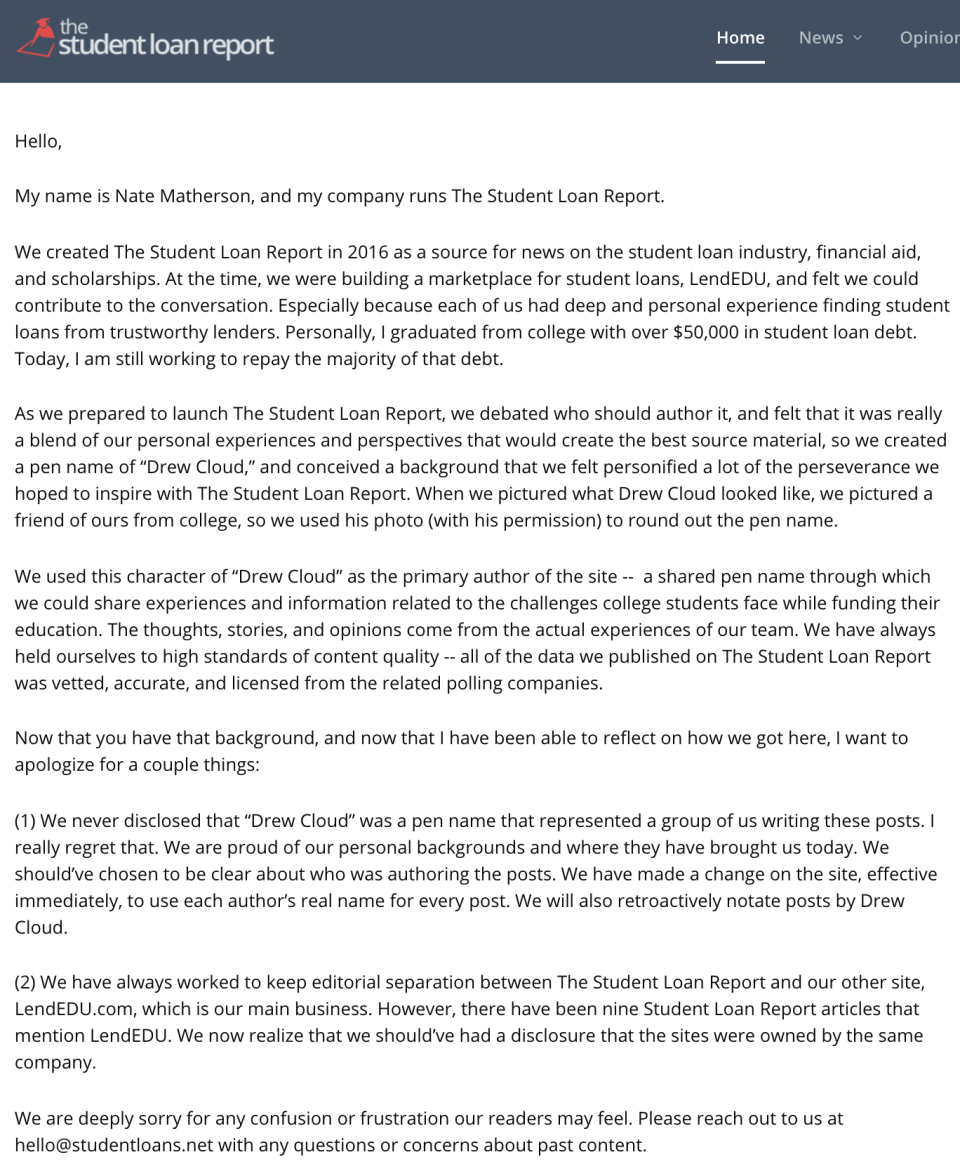How fake student loan expert Drew Cloud fooled real people
Drew Cloud was known as an expert on student loans. He was cited in publications like CNBC, The Washington Post and The Boston Globe, as founder of a site called The Student Report. He was also not real. In a stunning revelation by The Chronicle of Higher Education on Wednesday, it was revealed he was a totally fabricated person, and demonstrates how easy it is to fool so many (particularly in the media) with a professional looking website, catchy stats, an an authoritative voice.

Getty Images
The Chronicle’s report found that The Student Loan Report was created by New Jersey-based LendEDU, a marketplace for student loans and student loan refinancing. The Student Loan Report published its own articles offering student loan advice, and peddled Drew Cloud as its chief expert, pitching surveys to news outlets, purporting dubious statistics: 20% of student borrowers used financial aid money to buy cryptocurrencies; “somewhat less than half (27% to 43%) would trade their debt for contracting the Zika virus, 10 years without sex, five years without toilet paper (or moist wipes) or a hookup with Caitlyn Jenner.”
LendEDU’s CEO, Nate Matherson, posted an apology on its website Wednesday.

“We used this character of “Drew Cloud” as the primary author of the site – a shared pen name through which we could share experiences and information related to the challenges college students face while funding their education,” Matherson wrote.
How did LendEDU get its fake expert past so many?
The Student Loan Report began posting various articles and survey findings under Cloud’s name. And to further boost his credibility, they put up a picture of a real person which the founder said they had obtained with permission from a college friend. The picture would, according to them, would “round out the pen name.”

Cloud’s posts ranged from survey findings to studies evaluating college programs. The two surveys that were picked up the most included one on how 20% of college students were funneling their financial aid money into cryptocurrency to “quickly pay off their student debt.” Cloud opined to reporters who picked up the survey that “college students would be better off using that money on what it is supposed to be used on: living expenses.”
Mark Kantrowitz, publisher of PrivateStudentsLoans.guru, and a 20-year veteran in the student loan industry, who has also testified for student loan publicly in Congress on the student loan crisis in 2008, said that he saw the warning signs from this particular survey.
“Surveys do not have a tendency to report percentages to decimal points. Legitimate surveys don’t go down to that detail especially if you have such a small percentage size.” (The survey stated that 21.2 percent of students had used aid money to fund a cryptocurrency investment.)
When Kantrowitz was interviewed for the first time about this survey, he knew something was off. He did some quick math to figure out that if the results were true, “then you’d have millions of students investing in Bitcoin.” But “there was absolutely no evidence of this. The survey was bogus… this can’t be possibly be true.”
The other survey was titled “18 Insane Things Graduates Would Do to Get Rid of Their Student Loan Debt.” The list included the statistics about trading debt for the Zika virus, and more.
Cloud even wrote articles for The Columbus Ledger-Enquirer in Georgia, with headlines like, “Millennials buried under student debt may get some relief from employers,” or “How changes to bankruptcy code could affect your student loans.”
When people reached out to Cloud about student debt, he would suggest that they refinance their loans — which was one of the services offered by LendEDU, according to The Chronicle.
Questionable surveys
While the company has issued an apology for using a pen name, Kantrowitz noted they haven’t yet admitted to fabricating a lot of their survey results.
Yahoo Finance confirmed with Matherson on Wednesday that the survey results, at least to him, were accurate. Since the results were collated and published as licensed by a web survey company called Pollfish, it would be difficult to confirm the credibility of the respondents.

Matherson said the company was currently trying to contact the websites that quoted Drew Cloud, but said it would take time.
The profusion of surveys and studies also makes it easier to get questionable ones through. Joseph Orsolini, president at College Aid Partners, said that in the student loan industry, he sees “a lot information passed off as knowledge, but the ulterior motive behind it is a marketing purpose.”
“Anytime someone is quoting these oddball statistics, you need to take a look at it with a jaded eye.”
So how are consumer advocacy groups responding to this?
Christopher Peterson, a senior fellow at the Consumer Federation of America, and a law professor at the University of Utah, said this incident highlighted the lack of transparency in the student loan industry.
“The point to draw from this is that often times it’s very difficult for the public to discover whether there are conflicts of interest between the websites. The ownership of these websites is very opaque, so it’s very easy to establish companies,” said Peterson.
But even if it’s easy to set up a company, “not very many companies are enduring enough” for consumers to recognize. With few established brand names in the industry, consumers are more likely to rely more on relatively unknown companies like LendEDU and Student Loan Report, which could market and sell loan products of dubious quality and not meet their needs, said Peterson.
Related coverage:
